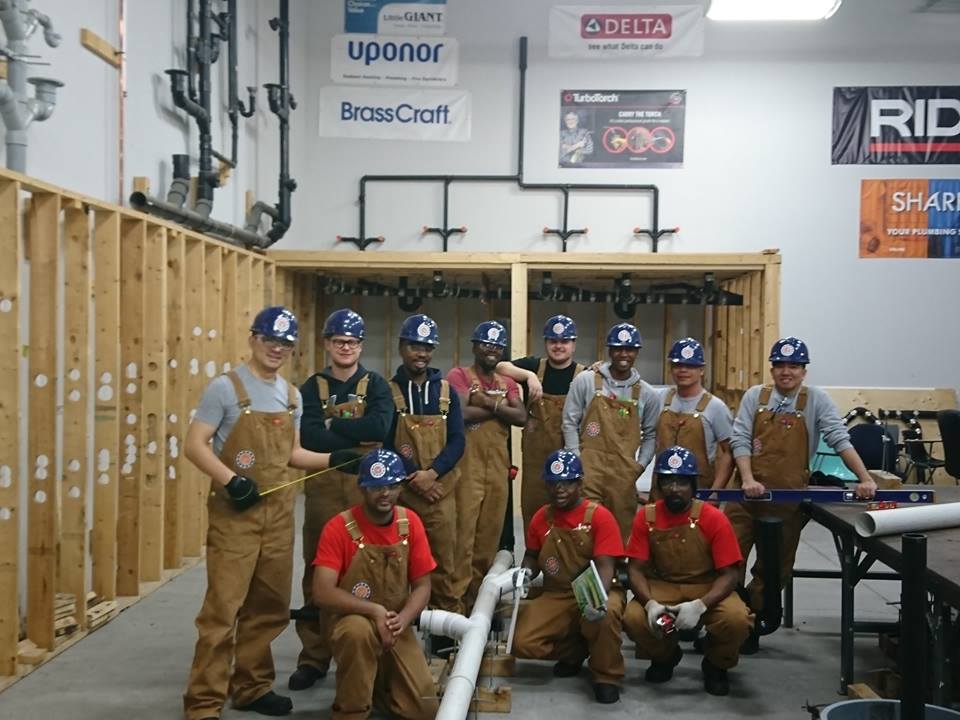Updated December 2025
In today's competitive job market, having expertise in a secondary trade can really increase your job options.
Building a diverse skillset makes you eligible for a much wider range of employment opportunities, giving you better chances for finding which career path works best for you.
This is why combined trades training could be your best choice.
At first glance, plumber and gas technician may sound like unrelated professions. But dig a little deeper and you'll find that there are plenty of great jobs that need exactly these two skillsets.
If you've considered pursuing training in either of these fields, read on to discover why it might be worth your while to take the combined option.
Gas Technician Skills are a Natural Fit for Plumbers
Plumbers and gas technicians have one important thing in common: they both work with pipes.
Piping systems are used to move water, gas, waste, and hot liquids. Plumbers are responsible for planning, installing, and maintaining these pipes and other related equipment.
On a typical construction job, plumbers get called in after the frame and roof are ready to install the plumbing systems. Duties on construction jobs may include:
- Studying building plans to determine the plumbing layout
- Selecting, measuring, cutting, and installing the required pipes
- Locating positions for connections
- Cutting necessary holes through walls and floors
- Joining pipe sections, assembling valves, etc.
- Testing pipe system for leaks and repair problems
Gas technicians also install, test, and repair piping systems, specializing in systems that use gas fuels. These include hot water systems, gas heaters and pumps, meters, regulators, and other gas appliances.
Similar to plumbers, gas technicians use hand and power tools to install piping and other systems, cut and fit pipes, and test and replace defective equipment.
Gas technicians also:
- Install venting, combustion air, and appliance electrical systems
- Check pressure, temperature, flow, and electrical current
- Advise and demonstrate safe working practices
- Investigate and fix gas leaks and related problems
- Clean, remove, or replace vent connectors, venting, or draft control devices
- Convert or reactivate old appliances
This type of manual labour requires a basic level of physical fitness, as you sometimes have to lift heavy pipes, be on your feet for long periods and work in cramped positions.
Related: What Does a Gas Technician Do? Duties, Challenges & Career Opportunities
When working with both plumbing and gas systems, you have to be safety-conscious and detail-oriented, with good problem-solving and hand-eye coordination skills.
You'll mostly be working independently, but you'll sometimes need to be able to communicate with team members and clients.
Great Employment Opportunities for Plumbers and Gas Technicians
With a solid knowledge of plumbing and drainage materials and methods, there are many possible paths your career can take.
After plumber and gas technician training, you may work in a wide variety of locations both indoors and outdoors, including homes, businesses, and different types of commercial and industrial buildings.
Earning a Gas Technician 3 certification in a combined plumber and gas technician program gives you even more job options. Plumbers with gas tech training and certification can work under supervision on appliances up to and including 400,000 British Thermal Units per Hour (BTUH).
With combined training, you'll be qualified to install, test, activate, and purge:
- Gas piping or tubing that's less than 2 1/2 inches in diameter
- Components in a piping or tubing system to an appliance downstream
- Natural gas meter or propane service valve up to an appliance control valve
This training prepares you for employment with maintenance departments of factories and other industrial environments, utility and gas companies, mechanical construction firms, and plumbing contractors.
Many professionals in this field also become self-employed.
Gaining Cross-Functional Skills in a Combined Plumber + Gas Technician Program
The first step to becoming a professional plumber and gas technician is completing pre-apprenticeship training. Here you'll learn all you need to know about understanding electrical diagrams and charts, identifying the right parts for every job, and the best service and installation methods.
Related: Key Skills You’ll Learn in a Combined Plumber + Gas Technician Program
Of course, safety is the most important priority for any construction job. With plenty of hands-on training, you'll learn the proper way to use hand and power tools, as well as MAPP and acetylene torches.
Safety training also includes:
- Electrical and mechanical safety requirements of the Occupational Health and Safety Act
- Environmental refrigerant laws (ODP)
- Safe use of hazardous materials with the Workplace Hazardous Materials Information System (WHMIS)
- Working at heights and in confined spaces
- Lockout & tag safety for properly turning off dangerous machines
- Aerial platform and scaffold training
You'll learn how to service, repair, and install all types of electrical and plumbing appliances. Soldering and brazing skills are also taught, so you'll be an expert in joining pipes and other metal materials.
Before you hit the job market, you'll receive valuable employability training. This includes resume writing, interview skills, timesheet guidance, customer service, and communication skills training.
Armed with the necessary skills for two in-demand trades, you'll find yourself with double the job prospects. Ready to start?
Interested in combining gas technician and plumber training?
Your next step is to speak with admissions. An advisor will guide you through the program, explain tuition costs, financial aid options, and much more.
Chat live with an advisor now. Or click below to explore the program in more detail. We're here to help!






